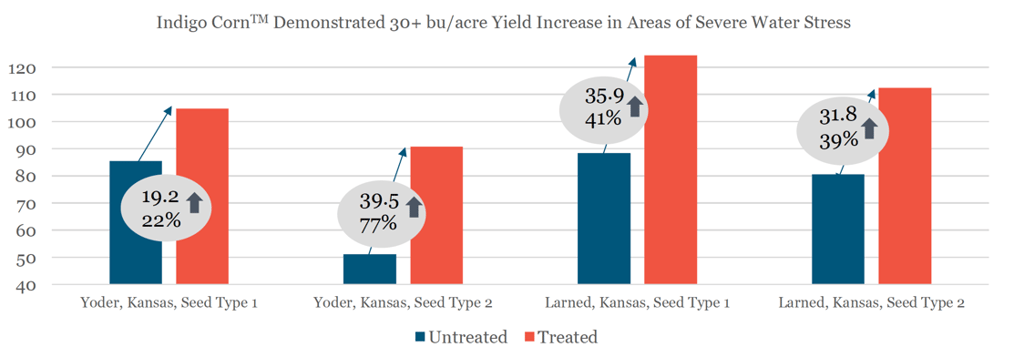- Indigo Corn demonstrates a 30+ bushel per acre yield increase on farms under severe water stress
- Indigo announces 47 cent per bushel premium at harvest for growers of Indigo Corn in 2018
Boston, Massachusetts, November 20, 2017 – Indigo Ag, Inc., a company dedicated to harnessing nature to help farmers sustainably feed the planet, has released preliminary data from its microbial seed treatment for corn. Indigo CornTM was commercially launched in the spring of 2017. Like Indigo WheatTM and Indigo CottonTM, Indigo Corn was developed from naturally occurring, in-plant microbes to increase the productivity of plants by improving their tolerance to water stress. With expected increases in both the frequency and severity of drought over the coming decades,[1] there is an urgent need for the development of water-efficient methods of food and fiber production.
Across the Midwest (Kansas, Indiana, and Ohio), Indigo Corn data was gathered from commercial fields. Crops were recently harvested in central Kansas, where fields received only 50% of average rainfall (classified by Indigo as “severe water stress”). Throughout the 2017 season, these fields received approximately 5 inches of rainfall, despite a historical average of 11 inches. Indigo Corn demonstrated yield increases of up to 77% (an additional 40 bushels per acre), with an average increase of 45% (an additional 32 bushels per acre). Yield increases were evaluated based on the control — corn grown in adjacent fields from seeds without microbial treatment — and were achieved without increased water or chemical application.
In Kansas, Indigo partnered with seed company Kauffman Seeds. “With little rain during our community’s growing season, corn yields have been low this year, around 80 bushels per acre,” said Tom Clayman, President of Kauffman Seeds, Inc. “Farmers growing Indigo Corn were protected, with yields well over 100 bushels per acre.”
“With an average $3 per bushel commodity price in corn, a 40 bushel per acre increase leads to a $120 per acre increase in revenue,” said David Perry, Indigo’s President and CEO. “This meaningful boost, in and of itself, could account for the profitability of a family farm.”
Under more optimal growing conditions this year in the Mid-south, Indigo Corn generally performed at parity with the control. In the few areas that experienced moderate stress (harvests in the 120-140 bushel per acre range), Indigo Corn demonstrated a 4% yield improvement.
The trend of increased performance from Indigo Corn on fields under water stress has been consistent with company trials across multiple regions and years. In Indigo’s greenhouse experiments, Indigo Corn demonstrated significantly greater root biomass than the control, seeing a 45% root biomass increase by mid-season. Additionally, Indigo Corn demonstrated an 11% increase in phosphorous and potassium uptake as compared to the control. While heat and moisture stress at flowering can lead to decreased yields due to failed pollination, Indigo Corn did not experience the expected kernel loss.
Indigo’s Head of Industry Relations, Dr. Kevin Kephart, will be presenting field and greenhouse data on Indigo Corn at the 2018 Commodity Classic (Anaheim, CA) and the Kansas Commodity Classic (Manhattan, KS).

Producing Indigo Corn™ Provides Farmers with Added Revenue through Premium Pricing
Committed to improving grower profitability, Indigo provides growers with more than the yield increase associated with its microbial technology. The company has developed a production model, first launched in wheat, that not only leads to more bushels per acre, but also to a higher price for every bushel.
With Indigo Corn, farmers in the United States can enter into a crop production contract and receive a guaranteed 47 cent per bushel price premium at the 2018 harvest.
The harvested Indigo Corn, grown with Indigo’s microbial technology, will then be sold to buyers willing to pay a premium for the crop. With the ability to trace Indigo Corn to the farmers’ fields on which it was grown, Indigo can provide both buyers and end-consumers with detailed information on the crop.
Buyers and end-consumers are increasingly willing to pay for premium food and fiber. Indigo’s goal is to help farmers grow higher quality crops through a more sustainable process. Quality refers to characteristics such as nutritional content and flavor profile. Process has broad environmental implications, allowing for crop production to put less strain on the planet’s natural resources. Traceability acts as an assurance of both quality and process, while forging a close connection between end-consumer and grower. Together, these three differentiators are the result of Indigo’s commitment to grower profitability, environmental sustainability, and consumer health.
Growers can enter into production contracts with Indigo throughout this year’s sales season, or until the receiver crop demand has been met. For more information, please visit the company’s website.
Learn more about how Indigo’s microbial technology performs under stress in a blog post from the company’s Co-Founder and Chief Innovation Officer, Geoffrey von Maltzahn.
To learn more about Indigo Ag, visit our about page.
MEDIA CONTACT
| Indigo Lauren Ashbrook lashbrook@indigoag.com
|
Kwittken for Indigo indigo@kwittken.com + 1 (646) 747-9390 |
[1] http://www.nature.com/nature/outlook/agriculture-drought/index.html




